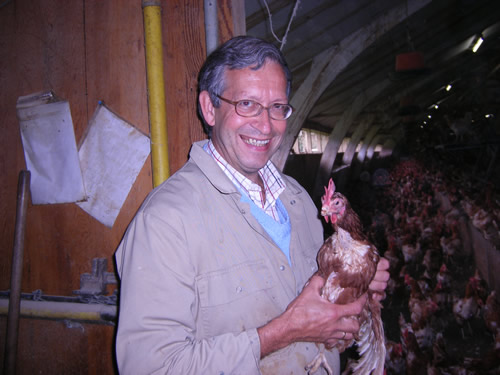
There is no exact BFREPA-equivalent in the Netherlands; but although Free Range producers do not have their own association, there are a number of organisations they can join. These include:
LAND- EN TUINBOUW ORGANISATIE NEDERLAND (LTO)
This is the national union for farmers in the Netherlands, open to everyone working in agriculture and horticulture. It has between 50,000 and 60,000 members, of whom around 1,000 are in the poultry sector. The vast majority of this category are also members of NOP. LTO is politically very active, and is involved in a wide range of projects that vary from investigations into specific issues within one particular sector, to more general studies of aspects of the rural economy.
NEDERLANDE ORGANISATIE VAN PLUIMVEEHOUDERS (NOP)
NOP is an independent organisation, funded entirely through members' subscriptions. It was founded 41 years ago. Its thousand or so members come from every part of the poultry industry, covering hens, ducks and turkeys; egg producers, poultrymeat producers, hatcheries and rearing farms (but not packing stations; the packers belong to their own European organisation). The General Secretary of NOP is Alex Spieker, and current Chairman is Mr Jan Wolleswinkel.
Throughout the year NOP organises meetings to address issues that affect its members. Every year there will be at least one meeting specifically targeted at each separate category of the membership (e.g. egg producers), and in some cases the topics will be of general interest to members from many different branches of the poultry industry.
NOP publishes an informative magazine, 'Pluimvee houderij' (Poultry Keeper). This has recently been relaunched as a three-weekly publication; previously a much thinner, weekly magazine used to be issued, but members seems much happier with the new three-weekly format.
NOP works closely with the government and other bodies. The Dutch government is generally supportive of the country's poultry industry, particularly in Organic and Free Range, and looks to NOP for advice when it is considering funding research projects.
Another very important function of NOP is the weekly egg price calculation. Each week, NOP publishes the prices for different categories of egg: cage/barn, white/brown (brown are more expensive); and different weights within each category. Alex Spieker, who is responsible for calculating the prices, explains that this is the market price; it is not related to production costs. The formula that Mr Spieker uses to calculate the prices is based on a range of data provided by the packing stations and other egg users in the Netherlands and in Germany. This index price per egg is the basis of the payments that the producer receives from the packing station.
Free Range producer Ton van Ginkel is a member of NOP. "Farmers always say that the subscription is very expensive," he says, "and I think the difficulty is that we don't always see what NOP is doing for us. But it is important to have an organisation that we poultry farmers can talk to. In the Netherlands, there isn't the same degree of solidarity amongst farmers as for instance in France. There, if one farmer has a problem, everyone will support him and do everything they can to make the government listen. In the Netherlands it's different. Farmers with pigs or cows don't want to know about the problems of poultry farmers as long as it doesn't affect them. So we need an organisation like NOP to talk to the government for us." Around 89% of poultry producers are members of NOP. Ton van Ginkel, like other association members, is a little unhappy about what the Dutch call 'free riders' – farmers who don't belong to any union or association; these people, he says, contribute nothing but still benefit from the work done by the farmers' organisations.
AB NEDERLAND
For an annual subscription of around 500 euros, many Dutch farmers join a scheme that gives them access to the services of experienced farm workers who, for an hourly rate, will help out or take over the running of the farm when necessary. The workers are supplied by AB Nederland, an independent company that is one of the largest employers in the country, with around 4,000 permanent workers and 10,000 temporary workers. AB can send out fully trained and experienced dairymen, pig and poultry workers, horticulturalists, arable farmers and forestry workers – mostly men, but also women who cook and help on the farm. Farmers who have used the scheme seem very satisfied with it. Most farmers regard it as a form of insurance; in an emergency – for example if a farmer is unable to work because he is injured or ill – someone with the right skills will be sent out immediately, and in such cases the hourly rate will be subsidised. But the farmer can also use this as a way of sourcing temporary extra help at busy times. Or if he wants to take his family away on holiday, he can make arrangements for a suitably skilled person to look after the animals and the business while he is away; this service is charged at a higher rate than emergency help.
